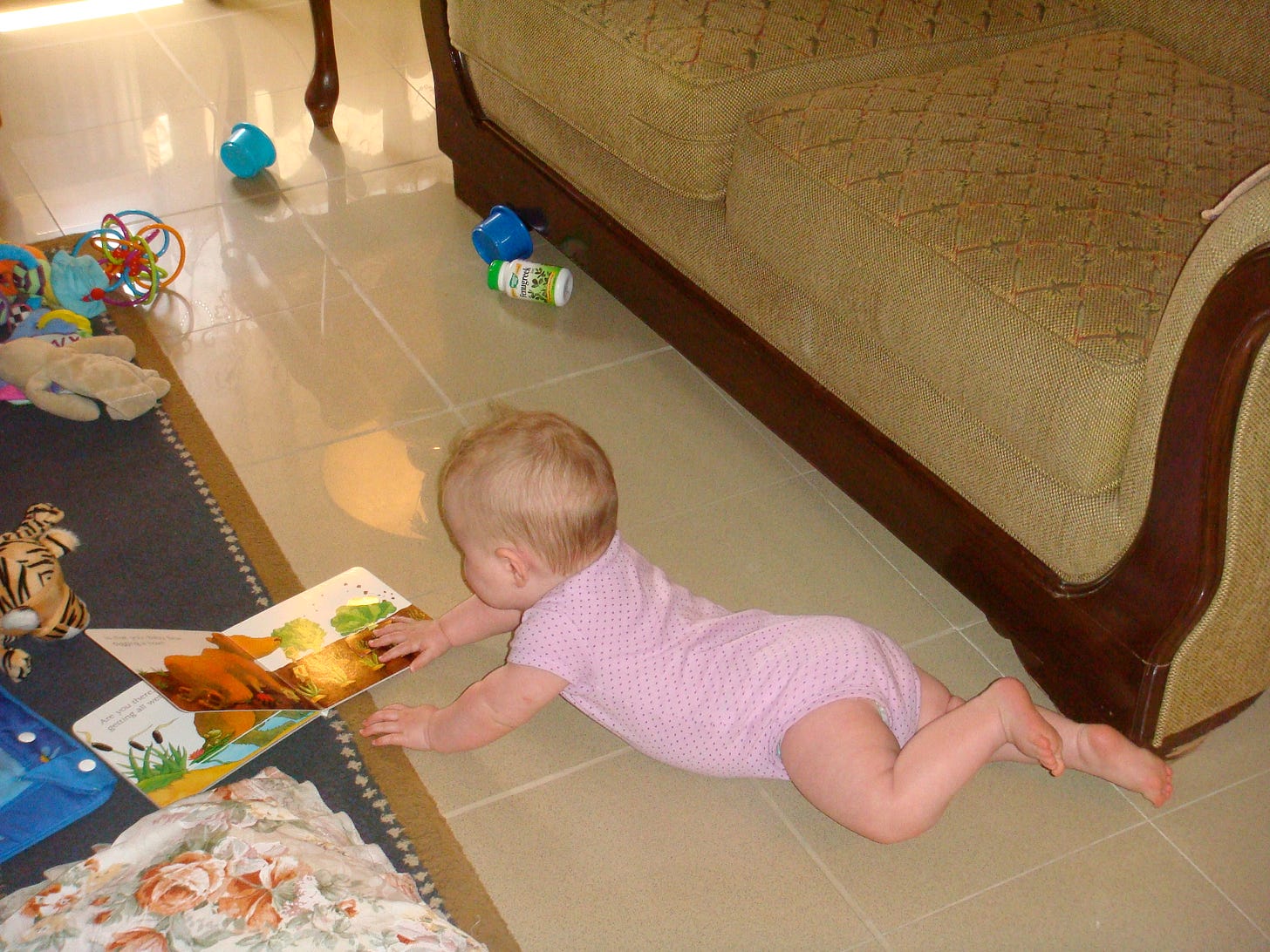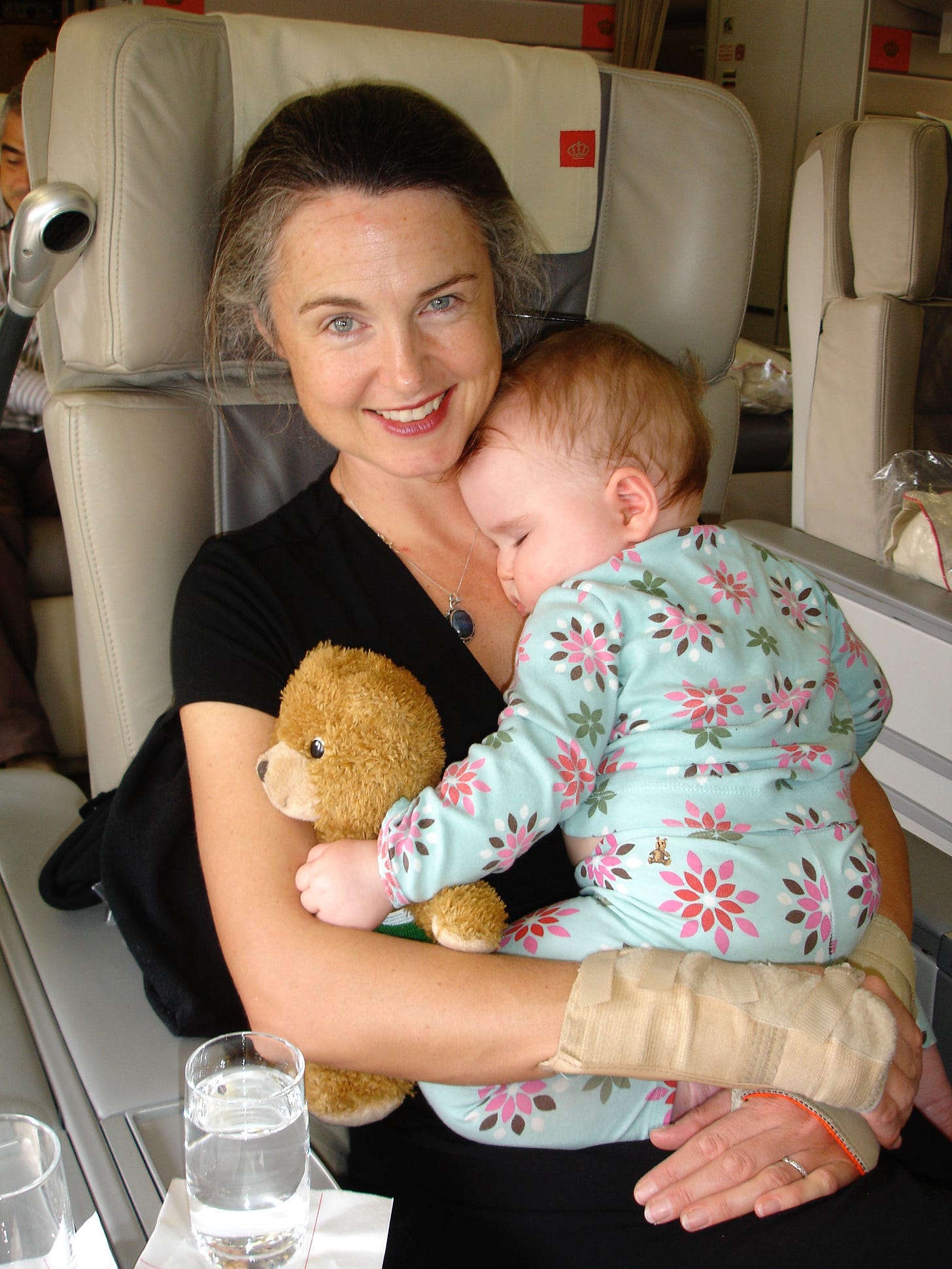The Separations, Part Two: Is this what marriage is?
Last week I left off the saga of our many forced separations just after a suicide bomber blew himself up on my husband’s car. Here’s what happened next.
At home, I had no idea that my husband’s car was speeding toward the embassy covered with body parts. I was pacing around the swimming pool holding Theadora, trying to convince her to fall asleep. When I heard footsteps, I looked up to see all the guards of the Residence racing towards me. “Madame, you need to get into the house,” they said. Automatically, I followed them. I had been instructed to always obey them (instructions that had been especially useful when I was kidnapped while pregnant with Theadora). “What is it?” I asked in Arabic. “Is there a problem?”
“No problem. But you need to get into the house.”
Inside, I asked the staff if they knew what was going on. “Maybe it’s another protest nearby,” they said. “Petrol prices have gone up.” Whenever there were protests, we were advised to stay home. But none of us knew for sure.
Anxious for Tim’s safety, I tried ringing his phone but got voicemail. Increasingly desperate, I rang the head of his bodyguards. Once he heard my voice, he said, “I’ll pass you to Tim.” He knew that if I didn’t hear it directly from Tim, there would be a split second when I wondered if he had survived.
Tim’s voice was calm. “Hi sweetheart, I was just about to ring you.”
“What’s going on?”
“My car was attacked on the way to the Embassy this morning.”
“No!”
“But I’m fine. The guys are fine. We’re not sure yet if it was a suicide bomber or a planted IED.”
“You’re okay?”
“I’m okay. Rather rude start to the morning, but I’m okay.”
“And the guys? No one died?”
“Only the bomber. Ali did brilliantly.” Ali was his Yemeni driver. He had kept going after the explosion, even as the windshield wipers swept blood and body parts from the glass. He did exactly as he was supposed to do, getting Tim to safety within the embassy. Tim promptly got to work alerting staff, telling everyone who wasn’t already at the embassy to stay home.
“And the car?” I didn’t care about the car itself, I wanted to know how bad the attack was.
“The car is not too bad. The car did its job.” Had he not been in an armored car, he would have ended up in a million little pieces.
“You’re okay?” I couldn’t ask this too many times.
“I’m okay. I will ring you later when we know more. I have to look after my staff. I’ll see you tonight.”
The rest of the conversation was a blur. I hung up and immediately realized I’d forgotten to tell him I loved him. How could I have forgotten to tell him that? I’d have called him back but he’d said his phone was ringing off the hook.
I found it impossible to focus on anything, wandering the house with Theadora in my arms. Negesti, the housekeeper, raced upstairs. “The ambassador is on TV!” she said. “And he is smiling!” I followed her downstairs to the little television set in Tim’s office. They were reporting on the attack, showing an old photo of Tim. “He’s not smiling now,” I clarified. “He is just smiling in the photo.”
I went numbly about my day, nursing the baby, checking the news online, answering my phone. I didn’t eat or shower or go to the gym. The house was surrounded by guards. There was one on the porch, shouting into his radio. One clattering up the stairs to the roof. One in the garden on his cell phone. We were not to leave the house, they said. I read the news stories streaming onto the Internet. “British Ambassador Survives Suicide Attack,” said one. Survives. The word sent a jolt of electricity through me. Survives. Meaning, he might not have.
I had known better than to ask Tim when he was coming home. He could never tell me when he was coming home, because it was understood that all of our telephones were tapped. It would be too easy to track his movements.
When I heard the door open that evening, I flew down the stairs, still clutching Theadora. Tim kissed me and leaned down to kiss Theadora. “Looks like you’re stuck with me a little longer, sweetheart,” he told her.
Looking back up at me, he said, “We have about seven minutes before the entire embassy descends for a meeting.”
Neither Tim nor I cried until a couple of days later, when it became clear that Theadora and I, along with the rest of the spouses and partners of the Embassy staff, were going to have to be evacuated. Tim hadn’t stopped working since the attack, maintaining a buoyancy I wouldn’t necessarily expect from someone who had just narrowly escaped an attempt on his life. We’re alike in that way; work helps us cope.
But when he told me Theadora and I were to be sent away, he broke down. “Suicide bombers I could cope with,” he said, “But not losing you.”
“You’re not losing me. You aren’t losing us. It’s only for a short while…” But it was hard to be consoling when I was crying too.
“I thought Theadora was going to learn to walk in Yemen. I wanted her to see Socotra. I wanted us to go camping together, to have pictures of her here,” Tim wept in my arms. “There is so much I wanted to do here with you.”
“I’ll never see Kawkab again,” I said. She was my star reporter when I was the editor of the Yemen Observer newspaper, and one of my best Yemeni friends. I hadn’t been able to see Kawkab since Theadora was born, because Kawkab had contracted typhoid. She had just gotten pregnant and was due in less than a month. Now she would never meet Theadora, and I would never meet her little boy.
We were losing the chance to explore more of this extraordinary country, which I had lived in and loved for four years. We were saying goodbye to Yemeni friends we might never see again, as well as scores of friends from all over the world.
When I was in London with newborn Theadora, people constantly questioned my decision to take her home to Yemen. “You’re going to take her back to the country where you were kidnapped?” they said incredulously. “And what if she gets sick?” Even our UK pediatrician rose an eyebrow and said, “she’s very young to go to the Yemen.” Tell that to the Yemeni babies, I wanted to say. Among the few people who understood were my parents. “You are a family,” my dad said. “You should be together.” Exactly.
Now we would be flying apart again. I had always assumed that evacuations were organized affairs, that the government would look after us. This could not have been further from the truth. The Foreign Office didn’t book or pay for our flights. Nor did they help us find somewhere to go or help with the enormous expense of relocation. Most of the embassy staff owned a home in London. They had somewhere to go to if they were evacuated. But we had nothing, no home outside of Yemen. We debated where Theadora and I should live, eventually settling on Jordan because it was a direct flight from Sana’a and Tim could visit us.
We knew no one in Jordan, but I had made a close Jordanian friend in Yemen, Saleh, who came from Petra. I don’t know how we could have managed without him. He helped us find an apartment in Amman, showed us around, and offered us a cousin as a babysitter.
When I think of our four months in Amman, I remember the friendly landlady who adored Theadora; staying up late to write while Theadora slept; and watching Theadora learning to clap, talk, and crawl (in that order). Her first word—and I swear I am not making this up—was “book.” Followed shortly by “duck.” A haze of nostalgia hangs around my memories of our little flat in that dusty city. But when I reread my journals, I find the pages full of sorrow and frustration. My journals are keeping me honest.
I didn’t like Amman. In my journal I wrote, “I can’t love a city where 1) you need to have a car to get around 2) walking to the nearest grocery store involves crossing three highways 3) Every single person chainsmokes everywhere 4) there is no green space and 6) it’s about 413 degrees in the shade. It is not a ME kind of city. I miss the hustle and bustle and intellectual life and endless walkability of New York, Paris, London, even Seattle.”
In the same entry, I wondered why I could not free myself from despair. Why could I not appreciate my life, all of my privileges? “I am in a place I have not chosen, perhaps for the first time in my life. Is that it? That I feel out of control of my destiny? Is this what marriage is? Never in my life have I ever had to move or live somewhere because of someone else. Now there are two other people to consider. I don’t resent this. Of course Tim has a career to pursue. And Theadora needs to be somewhere safe. So why do I find myself feeling so bitter and resentful?”
When Tim arrived, I was filled with a wild euphoria. I was overjoyed to be with him, and grateful to have help with the baby. But throughout the day these lovely feelings were replaced with stress over the ebbing away of our time together. There were always so many things we had to cram into our short times together – making baby food, looking after Theadora – heck, those two alone took all day! And then there was grocery shopping, visa applications, and logistical stuff. We never got any time to just enjoy each other.
Yet we survived. I found friends through Saleh, through the US embassy, and through our landlady. Friends are always the answer to any new place. Saleh’s cousin Sarah came to watch Theadora during the afternoons so I could work. Tim came every few weeks, and usually spent the entire weekend pureeing things for Theadora. You cannot buy premade baby food in Jordan, at least you couldn’t when we lived there. You make your own. We had to buy a blender, a tea kettle, a whole kitchen full of supplies.
I threw vegetables and tofu into a blender, or beans and vegetables, or fruit. When Tim pureed meals, he spooned them into little Tupperware containers and stacked them in the freezer. That way when he was gone, I could easily thaw a meal.
Just as we had settled in to our new life, just as the temperatures were finally falling, Tim came to pick us up and whisk us away to London. We were thrilled to be a family again. Tim and I agreed that he would never take an unaccompanied posting, that he would only apply for jobs in countries where we could accompany him. Two years later, we headed for Bolivia.
Next week we fastforward to Uzbekistan, where we were forced apart for longer than ever before, first by covid and then by cancer.






What a beautiful photo of you both on the plane.